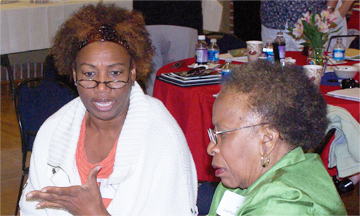
 GREENVILLE—About 160 people from 17 parishes met at St. Mary Church recently so they could take a closer look at the upcoming revisions to the Roman Missal.
GREENVILLE—About 160 people from 17 parishes met at St. Mary Church recently so they could take a closer look at the upcoming revisions to the Roman Missal.
The workshop enlightened catechists and educators so they may help teach their fellow parishioners in the coming weeks, when the first changes in almost four decades are introduced.
The Missal contains the words used during the celebration of Mass. Many of the familiar phrases that people have spoken or heard all their lives will change beginning the first Sunday of Advent.
Father Jay Scott Newman, pastor of St. Mary, celebrated Mass prior to leading a discussion of the changes that are in store.
Sister Pamela Smith, diocesan director of Catechesis and Christian Initiation for Parishes and Schools, predicted this transition will be much easier than the one dictated in the early 1970s as a result of the Second Vatican Council.
“This time they’re really giving us an opportunity to help educate people about the holy sacrifices of Mass and about what are the unchangeable elements and what kind of things can be changed,” Sister Pam said.
Father Newman quoted: “the translator is a traitor” and talked about the difficulty of translating centuries-old Latin rites into modern languages.
“When you take words or ideas from one language into another you always lose something,” he said. “You’ll always change something. Try to imagine reading Shakespeare in Polish. Every language has idioms that don’t translate, words that are similar but don’t mean the same thing.”
The priest also spoke about the philosophy of translating the rites, and how that has changed over the years.
He referred to a document released in 1969 that included guidelines telling translators to use “dynamic equivalents” when converting the texts to modern languages.
“We’re not going to do a literal, word-for-word translation; we’re going to translate concepts,” he said of the philosophy. “This is a perennial debate among translators. … This renders significant differences in translations.”
He cited one resulting translation of “The Sacramentary” that reflected both the haste of translation and the philosophy, noting that the work was being done so quickly that revised pages were sometimes sent to churches to be inserted into the original document.
For this translation, Father Newman said the philosophy and time constraints have changed, and the new Roman Missal will be more faithful to the original Latin writings.
This is partly because of a document released in 2001 by the Congregation for Divine Worship and the Discipline of the Sacraments, he explained.
“The primary preoccupation of the new document was: Liturgical translations of the Roman Rite in all foreign languages should reflect — as much as possible — the original wording of the Latin text,” he said. “Rome’s point was the unity of the Roman Rite requires that we make this effort so that no matter what language we’re praying in, we’re praying the same thing, in the same way.”
Nor did work on a new English translation of the Roman Missal suffer from a tight deadline.
“This is not random, this is not off-the-cuff, this is not a rush decision,” Father Newman said. “It was decades in the making to arrive at the conviction that we needed a new translation, and it was started almost a decade ago.”
The resulting text, he said, is “considerably different from what we’re used to,” and he predicted it would take a year for everyone to adjust to the Missal.
Another major difference, he said, is the new Missal “places tremendous emphasis on singing the liturgy,” instead of the current practice to “sing around the liturgy.”
The new Roman Missal has been printed and will be shipped out to the 19,000 Catholic parishes in the United States on Oct. 1.
During a question-and-answer period, Father Newman said “the book we’re going to get in November will be the book we use for the next 40 years.”
Rita Brown, a member of St. Mary, said she’s looking forward to using the new version.
“I believe the new translation is more poetic,” she said. “The prayers are beautiful. I love the Mass — I think it will elevate people’s concentration.”
